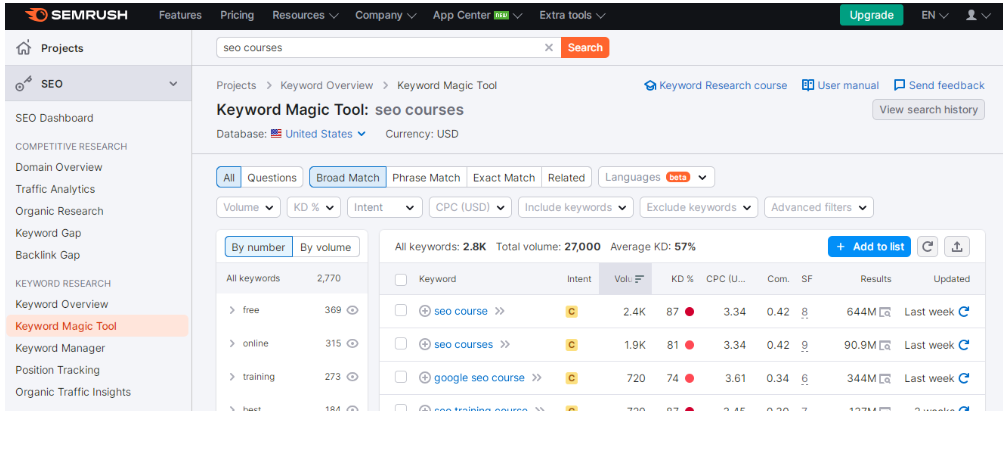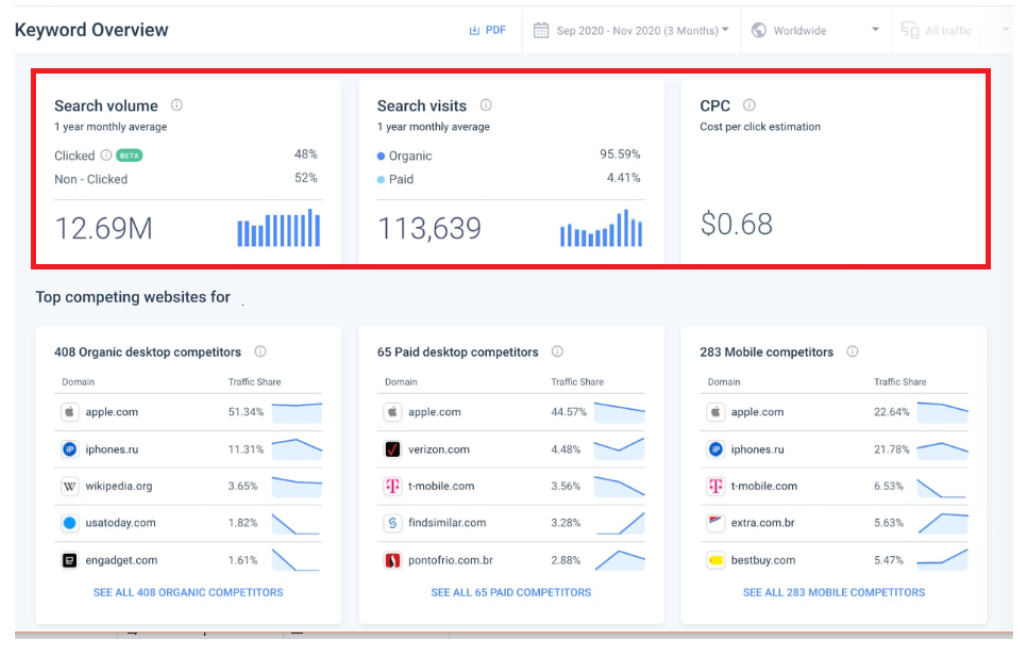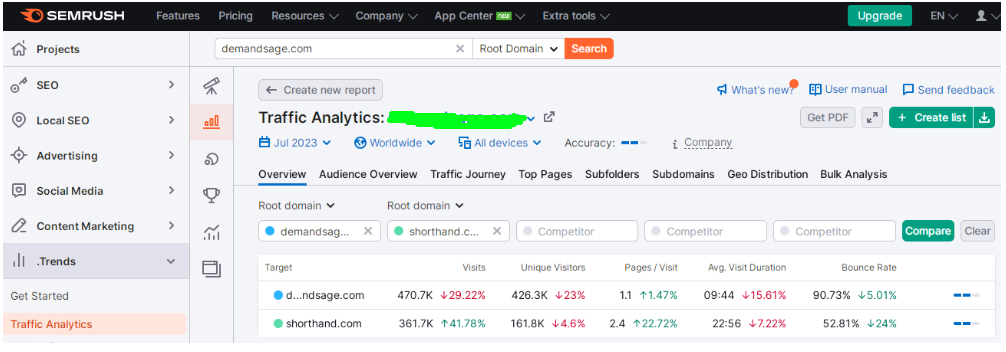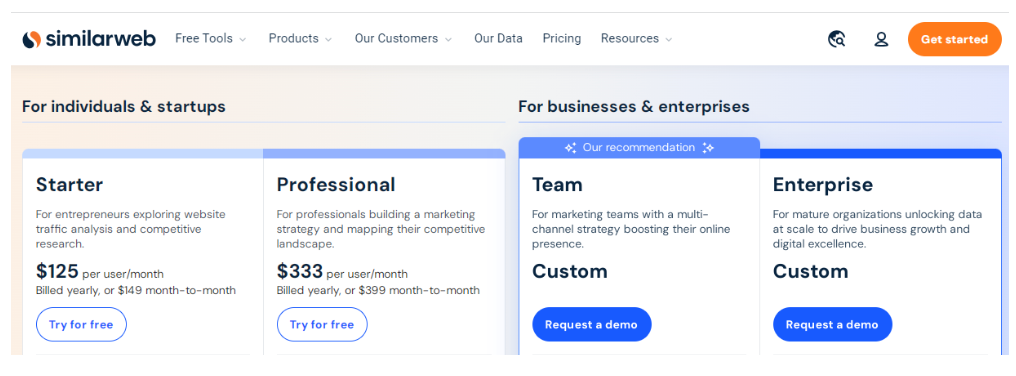SimilarWeb vs Semrush is a common comparison for digital marketers, SEO specialists, and business strategists seeking insights into web traffic and online performance.
Both platforms offer a suite of tools designed to provide an in-depth look at competitive analysis, keyword research, and market intelligence. SimilarWeb excels in offering user-friendly traffic insights and audience analysis, while Semrush is renowned for its comprehensive SEO toolkit and PPC data.
Choosing between the two often depends on specific business needs, budget, and the level of detail required for the task at hand. That’s why we have thoroughly compared both platforms based on their ease of use, features, pricing, and pros & cons.
So, without further ado, let’s get started.
Similarweb vs Semrush – Quick Summary (2024)
Ready for the comparison? Let’s first understand the core distinctions between Similarweb and Semrush with a quick summary;
| Attributes | Similarweb | Semrush |
| Primary Strength | Website Traffic Analysis | All-in-one SEM & SEM tool |
| Pricing | $125 – $333 per month | $129 – $499 per month |
| Free Trial | 7-Day Free Trial | 14-Day Free Trial |
| Free Plan | Free traffic analytics suite | Basic Free Plan ( 10 Searches) |
| Pros | Straightforward Interference, Good Audience Insights | Ultra-detailed Insights and comprehensive SEO features. |
| Cons | Limited keyword and Backlink insights | Too technical for newbies, High Price |
| User Interface | Straightforward & Informative Dashboard | Detailed and a bit overwhelming interface |
| Website Analysis | Accurate traffic Insights, particularly referral traffic | Ultra-comprehensive traffic details with Semrush .Trends |
| Competitor Analysis | Identifies top competitors and their marketing channels. | Too detailed competitor analysis ( keyword gaps, on-page and off-page SEO, content type, etc.) |
| Backlink Analysis | Only basic backlink analysis | Advanced backlink analysis ( 43 trillion backlinks database) |
| Rank Tracker | Limited Rank Tracking (5 competitors domain) | Detailed Rank Tracking ( Up to 50,000 keywords) |
| Content Analysis | No Content Analysis Tool | Dedicated Content analysis and optimization tool |
| Customer Support | Knowledge Centre, Email Support | Knowledge hub, email, phone, and live support |
When To Use Similarweb?
Here are some scenarios where Similarweb will be beneficial
- Simplified Traffic Analysis (Free)
- Quick Competitor Analysis
- Audience and demographic details.
- Details about traffic engagement, like bounce rate, session duration, visit time, etc.
- Identify traffic types like direct, organic, referral
- Identify new markets and track industry growth
When To Use Semrush?
Semrush is an all-in-one SEO tool, so it will be beneficial in the following scenarios;
- Rigorous and extensive keyword research
- Complete SEO analysis ( On-page, Off-page, Technical)
- Devising SEM strategies.
- Comprehensive content optimization
- Precise Competitors analysis
- Effective and on-spot rank tracking
Similarweb vs Semrush: Pros & Cons
No tool is flawless; however, understanding their limitations simplifies decision-making. Let’s weigh the pros and cons of Similarweb and Semrush;
Similarweb Pros
- Data granularity about traffic sources is top-notch.
- Provide excessive insights into users’ behavior on the website.
- Include an intuitive, user-friendly dashboard.
- Data visualization is sleek and modern.
- Provide valuable insights about audience demographics.
- Provides a detailed overview of marketing channels.
- Helpful details on bounce rate, page views, etc.
Similarweb Cons
- Data updates need to be more frequent
- Data accuracy falters in the case of smaller, niche websites.
- High prices can be prohibitive to smaller businesses.
- Customer support is limited.
- It is not so SEO-centric as other tools like Semrush.
Semrush Pros
- Features a straightforward domain analysis tool.
- Data visualization is top-notch
- Powerful link-building features.
- Detailed site audits with easy-to-follow instructions for clearing errors.
- Provide comprehensive PPC data.
- You can pull more data per report with Semrush compared to Similarweb.
- Multiple avenues to avail of support.
- Semrush Academy features a range of courses to learn SEO for free.
- Provide a 14-day free trial.
- Extensive integration with their party tools and apps is available.
Semrush Cons
- The learning curve is relatively steep compared to tools like Similarweb
- Semrush plans are pricey.
- Semrush subscription only allows one user. Additional users come at a hefty price.
- The interface is not as polished as Similarweb.
Bonus: If you want to boost your brand with a white-label SEO tool, then check our list of the best white-label SEO tools you can use.
Similarweb vs Semrush: Feature Comparison
You can truly understand the worth of a tool when you analyze its features. Let’s evaluate and compare the features of Similarweb and Semrush and see which tools outdo the other.
Keyword Research
The strength of keyword databases primarily drives keyword research, and in this respect, Semrush Seems way ahead of Similarweb. While Similarweb only includes 5 billion keywords in its database, Semrush boasts a massive keyword database of about 25.1 billion keywords.

This vast difference is particularly reflected when you search for related keyword ideas. Incidentally, Semrush’s Keyword Magic Tool can churn out over 20 million keyword ideas for a single keyword. While Similarweb has a keyword generator tool, it doesn’t pull as many details as Semrush.

But it outmatches Semrush in other aspects – it can separately suggest keyword ideas for Google, YouTube, and Amazon. This categorization eases keyword analysis and makes the process simpler. Besides, another aspect of Similarweb that catches attention is the extrapolation of traffic data from various keywords. You can analyze about five domains and predict traffic details for the future for given keywords.

On the Semrush side, you have paid keyword analysis that is more robust than Similarweb. Besides, the extra filters and helpful search intent matrix push Semrush keyword analysis ahead of Similarweb. But most importantly, it is the paid keyword analysis or auditing tool that takes away the most points. Not only does it reveal the most lucrative paid keywords, but it also offers recommendations on how to implement keywords in PPC ads.
Winner – Both Similarweb and Semrush include powerful keyword analysis features. You can use either of the tools to power your keyword research and find quality keywords. But Semrush manages to come on top with its ultra-detailed Keyword Magic Tool, supermassive keyword database, and outstanding PPC keyword analysis capabilities.
Competitor Analysis
Similarweb has unique benchmarking data points for comparing rivals – it analyzes page visits, bounce rate, time on site, audience demographic, traffic sources, etc., to form a list of competitors.
Likewise, it also reveals the marketing channels of competitors, keyword traffic share based on location, search intent, organic traffic, and keyword difficulty. Semrush offers the same depth in competitor analysis or perhaps a bit deeper with its latest Market Explorer tool. It reveals information like top competitors, industry, demographics, interests, etc.
However, Semrush showcases its true expertise in competition analysis with its Audience Overlap feature. It enables you to accurately gauge audience behavior and analyze what platforms users visit to find answers to their search queries.
You can use the information to spot the most effective platform for content delivery. And then there is the Top Pages report that lets you delve into the best-performing content of your competitors. Semrush takes the lead here because Similarweb doesn’t include any such feature.
Similarweb covers some ground with its outstanding referral traffic analysis capabilities. This information could help you identify the top affiliates in your industry with whom you can collaborate to diversify your traffic acquisition channels.
Winner – Both tools flex muscles with their ultra-detailed competitor analysis feature. The decision between them for a winner is a close call as they both seem equal. If Similarweb brings unique session analysis capabilities, Semrush offers in-depth competitor ad spending and social media strategies. In short, it’s better to call it a draw, as Similarweb and Semrush boast outstanding competitor analysis functionality.
Traffic Analytics
While this aspect can easily be part of competitors’ analysis, I wanted to discuss it separately. The reason is that Similarweb is primarily used for quick traffic analytics, while Semrush has recently added a new traffic analytics feature that is part of Semrush.Trend toolkit.

Upon comparison, I found that both tools offer similar details about traffic acquisition channels, bounce rate, average visit duration, and percentage changes in monthly visits. However, Semrsuh displays one extra matrix: unique page visits. I couldn’t find such details in Similarweb.

Likewise, there are significant differences in the traffic number displayed by both tools; Semrush, in my case, underestimated the traffic. It points out the data accuracy, and Similarweb seems to have a slight edge in this respect.
Similarweb vs Semrush: Pricing
Pricing is a critical point that dictates the suitability of a tool for any particular business. Incidentally, both Similarweb and Semrush are elite tools with high pricing. That’s why the comparison comes down to the price-to-performance ratio that each tool provides. Let’s compare the pricing then!
Similarweb Pricing
Similarweb divulges details of two paid plans;
- Starter Plan – $125 monthly ( Suitable for bloggers, markers, and small businesses)
- Professional Plan – $333 monthly ( Suitable for experienced marketers, SEOs, and medium to large-sized businesses and agencies).

Furthermore, there are two custom plans for big teams and enterprises. Additionally, Similarweb also includes a 7-day free trial to give a glimpse of its working.
Semrush Pricing
Semrush offers three paid subscription plans. We have also partnered with Semrush to offer an exclusive 14-day free trial on the Pro and Guru plans.

- Pro Plan – $129.95 monthly ( Suitable for SEO newbies and small teams).
- Guru Plan – $249.95 monthly ( Suitable for small agencies and mid-sized businesses).
- Business Plan – $499.95 monthly ( Suitable for big agencies and businesses).
| Plan Offerings | Similarweb | Semrush |
| Subscription Plan | Two paid and two custom plans | Three subscription plan |
| Suitability for business | Suitable for medium to large-sized business | Tired pricing suited for businesses of all sizes |
| Value for money | Prices are higher for advanced features | Prices are high but include a broad range of features. |
| Keyword Reports | Limited: 1000 – 5000 | Substantial: 10,000 – 50,000 |
| Number of Users | Single User ( Paid Plan) | Single User ( Paid Plan) |
| Custom Plan: 5 – 10 Users | Additional Users: $45 – $100 extra based on the subscription plan. | |
| Historical Data | Limited: Up to 37 months | Extensive historical data back to 2012 |
When you compare the pricing of Similarweb and Semrush, it’s clear that Semrush offers more value for money. While Similarweb emphasizes heavily on web analytics, Semrush takes an SEO-centric approach.
This doesn’t mean that Similarweb lacks SEO tools; they are not as extensive as Semrush. You cannot find tools for local SEO, content optimization, Social media, AI-assisted content creation (impact hero), and more in Similarweb.
Likewise, the amount of data you can pull in Similarweb is much less than in Semrush. For example, the keywords report is only limited to 5000 in Similarweb, while Semrush has about 50,000.
Winner – Semrush has a better price-to-performance ratio, and we also have an exclusive coupon on Semrush that can help you get upto 17% discount.
Similarweb vs Semrush: Usability
| Usability Aspects | Similarweb | Semrush |
| User Interface | Intuitive and straightforward interface | A bit rugged interface |
| Navigation | Simple navigation with clear menu options | Accessible features but navigation not as smooth as Similarweb |
| Data Visualization | Well structured | Excellent data visualization |
| Learning Curve | Moderate learning curve due to low feature depth | Steep learning curve due to extensive features. |
The above table details the usability of Similarweb and Semrush. Similarweb seems to be ahead of the curve regarding usability. It doesn’t mean that using Semrush is challenging; it’s just that Semrush is more comprehensive feature-wise. Therefore, getting a grip on the tool takes time.
In contrast, even newbies could easily make the most of Similarweb and easily access web analytics data. The simple scroll down to access separate matrices makes data more digestible.
Semrush has to cram too many details together, which lowers the accessibility and ease of use a bit. But Semrush is a data powerhouse, and underneath all the ruggedness, there’s precise data for SEO evaluation. Also, despite the initial complexity, Semrush offers data visualization at par with Similarweb.
Winner – None – Although Similarweb impresses with its ease, Semrush wins over the depth of data it provides.
Similarweb vs Semrush: Customer Support
| Similarweb | Semrush | |
| Phone Support | No | Yes |
| Chat Support | Yes | Yes |
| Email Support | Yes | Yes |
| Training Resources | Blog, Knowledge Centre, Similarweb Academy, Webinars | Semrush Knowledge Base, Semrush Academy |
Semrush takes an extra point with its phone support facility. In contrast, Similarweb doesn’t have phone support. Besides that, both Similarweb and Semrush share the same level when it comes to availing support. Both offer similar ease and extensive support. Also, the wait time is identical, which is around 15-20 minutes when you go the email route.
However, Semrush again takes the lead with its training resources. Compared to Similarweb, Semrsuh’s support material is more detailed. Likewise, Semrush Academy offers way more courses than Similarweb Academy. Most importantly, Semrush Academy courses are taught by leading SEO and digital marketing experts, such as Brian Dean, etc.
Winner – Semrush appears a shade better regarding support on the strength of its extensive support materials and comprehensive education platform (Semrush Academy).
More Semrush Comparison:
Conclusion: Semrush is Better than SimilarWeb For Beginners
I must say Similarweb and Semrush are both powerful, comprehensive, and feature-rich. Still, Semrush appears to be ahead of Similarweb in many aspects. It got a better keyword research module and beat Semrush with its ultra-detailed Keyword Magic Tool and paid keyword analysis.
Likewise, detailed content analysis is still elusive to Similarweb, as is Local SEO search and Backlink analysis. Likewise, the Site Audit capabilities are also superior to Similarweb. However, one aspect where Similarweb is on equal footing is competitive analysis. In fact, its session analysis is unique and allows a lead over Semrush. But, Semrush levels it with the ad spending details and competitors, SMM Strategies.
What’s the bottom line then? Well, Semrush is hands down the better tool. You can sign up for the 14-day free trial to get a quick overview of the tool. However, if you are explicitly focussing on traffic-focused competitor analysis, Similarweb might be a good option.
